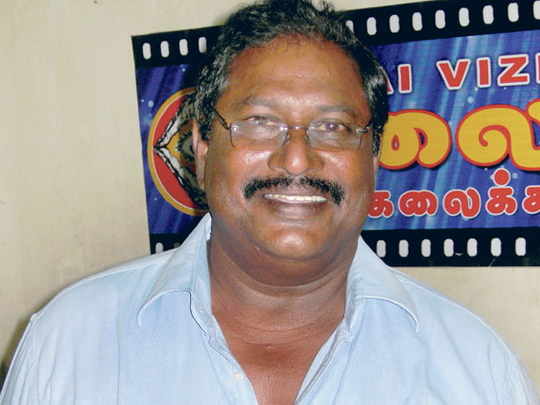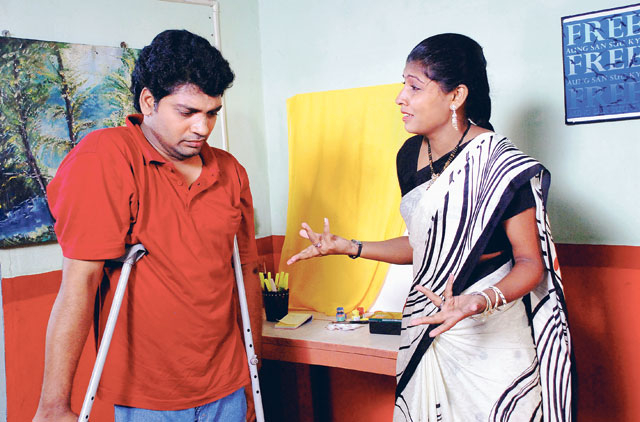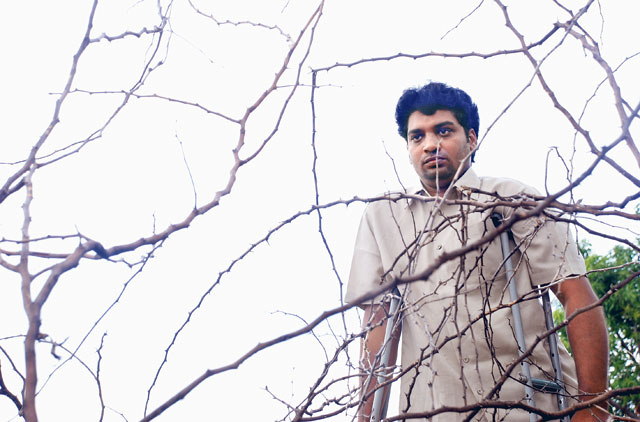
Indian films on the disabled are not new. Sanjeev Kapoor and Jaya Bachchan portrayed a hearing- and speech-impaired married couple in Koshish; Sudha Chandran's Nache Mayuri tells the story of a triumph of the human spirit in the face of adversity; Aamir Khan's Taare Zameen Paar revolved around a dyslexic child. So what is new about the Tamil film Maa?
Although this film also dwells on issues that cripple the lives of the disabled, what makes it different is the fact that the film's technical crew comprises physically challenged people, except for Madan Gabriel, the brain behind this unique venture.
Calling the shots from her wheelchair was 25-year-old director Fatima Beevi. Cinematographer S.R. Rao is fitted with an artificial limb. Costume designer M. Devi lost her right hand at 10 when it accidentally got caught in a rice mill. Polio-afflicted Amudha Rajini is the choreographer. Scoring the music is visually-challenged Gideon Karthick.
The list goes on to include an awe-inspiring number of 40 differently-abled persons. Even the spot boys, cooks and drivers of the unit were physically challenged. That is no mean feat for Gabriel, a former professor at MGR Government Film and TV Institute, Taramani, Chennai, who initiated this project.
Maa entered the Limca Book of Records this year for its unusual accomplishment.
Gabriel, with more than three decades of experience in teaching acting, says: "Acting and theatre are my passions. I often direct experimental plays with fresh faces — people from villages who have never stepped on stage. I was keen on doing something for the benefit of the less privileged before the end of my career, a wish I have been nurturing for long."
The seed of the film was sown nearly 15 years ago when the professor, on one of his experiments with visually-challenged students, thought to himself, "Why not a film with disabled persons?"
Gabriel had the script ready. He met G. Chidambaranathan, president of the Tamil Nadu Handicapped Federation Charitable Trust, Chennai. Together, they set up a production house, Kalai Vizhi (meaning Artistic Eye), in 2009. The next step was to scout for talent. Kalai Vizhi conducted competitions exclusively for the differently-abled in 14 categories relating to cine art.
The 55-year-old teacher remembers: "The moment I noticed Deepak on stage, I knew I had found my film's hero." T.M.N. Deepak is a clinical psychotherapist and walks with the help of crutches, owing to post-polio paralysis at the age of three.
"Fatima, a commerce graduate [another polio victim], won prizes in ten categories and impressed us," Gabriel adds.
She was made the director of the film. Karthick, who lost his eyesight following unsuccessful eye surgery as an 11-year-old, found his moorings in music. After completing the fifth grade in Western music, he set up his own recording studio. Someone suggested his name to Gabriel and Maa found its music composer. While the lyricists — Chidambaranathan (who composed the introductory song and sang it too), Bhavani Kannan and Thamizh Iyalan — are physically challenged, the singers are visually challenged.
Karthick's joy knew no bounds when the songs were played on a Sydney radio station. The soulful and melodious compositions are brilliant. But the best moment arrived when a young woman called up to say that she found the will to live after listening to the song Agni chirakal viriyattum, vaanam dooram illai (Let the wings of fire spread, the sky is not far away). The lyrics were penned by Karthick and he sang them too.
"I was stunned to hear that she had contemplated suicide after her husband's death. But the song changed that. She found strength to face life again. That was a wonderful moment," recalls the 29-year-old composer who also has a small role in the film.
Rajini, the film's choreographer, is a diploma holder in software engineering. Besides training the heroine in Bharatanatyam, she choreographed for a group song featuring 50 people.
"We were one large family on the sets in Madurai," smiles Amudha, and that includes her two-year-old daughter.
R. Thavamani certainly did not have films on her mind while grazing goats and cattle in her village in Vizhupuram.
The eldest daughter and the sole breadwinner of her family, she was responsible for the make-up.
Cinematographer S.R. Rao works with the Tamil Nadu Films division and boasts more than 20 years of experience in shooting documentaries. He lost his left leg in an accident in 2000.
Once the crew was finalised, they underwent training in all aspects of filmmaking. Several hailed from interior villages with no knowledge of filmmaking. All they carried in their hearts was a love for creativity and a yearning to achieve something.
Gabriel says: "People residing in cities get opportunities. It's the disabled people from lower sections of society who are a deprived lot and unaware of their rights. Maa is a platform to highlight their talents."
Maa begins like any other commercial film. The heroine falls in love with the hero, little realising that he is disabled. She invites him home to meet her parents and there the truth is revealed, much to the disapproval of her parents. The dejected hero attempts suicide but his friend stops him and counsels him to take up the cause of the disabled.
As the story unravels, the viewer gets a glimpse into the world of the differently-abled and the apathy of society towards them. The film attempts to raise awareness about their woes, yet it is no documentary. It is a commercial film, with music and dance thrown in.
Real-life incidents highlighting their trials are woven into this love story, such as the scene in which the physically-impaired Kamakshi is not allowed to use the toilet in a house she visits even after climbing up a flight of stairs on all fours. Finding a room for a disabled woman in a hostel is impossible, claims Gabriel, talking about his efforts to find a place for Fatima.
As for barbs at the visually challenged, you must talk to P. Aruna Devi, who plays a significant role in the film.
"Bus conductors ignore us when we hail them to stop.
There have been occasions when we have just climbed on to the footboard and then the bus conductor blows the whistle. Just think about the physically challenged, they need more time to get on the bus."
Insensitive onlookers add insult to injury by making remarks such as: "Since you have lost your eyes, why can't you stay indoors? What do you want to achieve outside?"
"We may be disabled, but we have our abilities. Give us a chance to prove ourselves," says Aruna Devi, a research scholar in criminology and social work.
Interestingly, she dubbed in her own voice for the film, something even Gabriel had doubts about. When they were considering using dubbing artistes for the visually challenged, Aruna wondered if she could do it herself. So she was given a chance.
"I put on the headphones and followed the pilot track," recalls Aruna Devi. "The screen started rolling. Listening intently I counted the time in seconds, the duration of gap between my dialogues and others. When it was played for the third time, I delivered my lines. It was recorded successfully on the first take itself." The joy rings clear in her voice as she laughs.
Aruna Devi trained other visually challenged artistes in dubbing. As assistant director, she also took care of voice modulation of the entire cast.
Although the government has reserved 1 per cent of jobs for the disabled, they do not benefit from this.
"People decide we cannot do certain jobs. How can they deny us opportunities? We can work in advertisement jingles and radio stations. We can lend our voices," says Aruna without any trace of bitterness.
Shot in the temple town of Madurai over 50 days, Maa, as the name implies, is a tribute to all mothers who did not give up on their disabled children.
"I do not view my team members as disabled but as normal humans and expected them to be independent. Everyone reported to the sets on time at 7 in the morning. No one was excused on account of his or her disability. They did all the work themselves," says Gabriel, who plays a social worker in the film.
What about funds?
"I borrowed money," he says. "We have not yet paid anyone for their work. Maa began as a social project for the differently abled. I hope to pay them once the film is released and well received."
Did he at any stage find the going hard?
"I never felt that way during the making of the film. I encountered hurdles only after its completion.
"When I approached radio stations to relay its music, they refused. Television channels were apathetic. Marketing is a major setback. Distributors are wary. It is disheartening."
Work on the English subtitles is on and the digital film is being converted into celluloid format.
"This is essential for participating in international and national film festivals. We are looking for sponsors to dub it in other Indian languages to reach a wider audience. Publicity of the film on television and radio will help."
It is scheduled for a July-end release, and Gabriel hopes the film will sensitise society about the travails of the disabled, encourage policymakers of the government to act and also open new doors of opportunities for his special team.
After all, Maa is not the culmination of this journey of self-discovery; it marks a new beginning.
Gabriel, who is referred to as the "beacon of hope" by his crew, is back to scripting a new story. Once again it will deal with those on the fringes of society — the tribulations of a transgender.
Knowing Gabriel, you can be sure the film will be executed by a team of members of the third gender.
Mythily Ramachandran is an independent writer based in Chennai, India.














